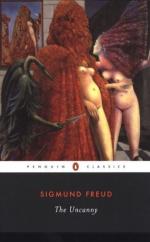
|
| Name: _________________________ | Period: ___________________ |
This test consists of 15 multiple choice questions and 5 short answer questions.
Multiple Choice Questions
1. What does Freud focus on in the essay "Family Romances"?
(a) The love in family.
(b) The development of basic romantic attachments.
(c) The relationships of family.
(d) The development of family.
2. What does Freud call the process of one generation superseding another?
(a) The growth of civilization.
(b) Surpassion.
(c) Desire to overdo.
(d) Desire to be better.
3. What does Freud associate Da Vinci's view of his father to?
(a) His view of religion.
(b) His view of life.
(c) His view of love.
(d) His view of God.
4. How did Da Vinci perceive romantic love?
(a) With regret.
(b) With disgust.
(c) Too idealized.
(d) With hope.
5. What was Da Vinci's nickname that Freud agrees was an appropriate name for him?
(a) The Italian-Faust.
(b) The Italian Dreamer.
(c) The Italian Lover.
(d) The Italian Stallion.
6. What does Freud intend to do by looking at Da Vinci?
(a) Discern important facts about human psychology.
(b) Discern important facts about Italy.
(c) Discern important facts about art.
(d) Disecern important facts about the Reniassance.
7. How does the son begin to see his mother after learning about his parent's sexual roles?
(a) As a goddess.
(b) As a form of Satan.
(c) Sexually.
(d) Asexually.
8. How many parts is "Leonardo da Vinci and a Memory of his Childhood" divided into?
(a) 8.
(b) 6.
(c) 7.
(d) 5.
9. How does the child view his parents, according to Freud?
(a) As the greatest people.
(b) Perfect.
(c) As the worst people.
(d) Like God.
10. What did Da Vinci desire that was a common desire in many dreamers?
(a) To swim.
(b) To die.
(c) To fly.
(d) To live forever.
11. What does Freud believe Da Vinci turned to, to better his art?
(a) History.
(b) Geography.
(c) Science.
(d) Religion.
12. How did Da Vinci differ from other artist's?
(a) He seemed uninterested in promoting his work.
(b) He made his work look genuine.
(c) He was never inspired.
(d) He was better than they were.
13. What smacks baby Da Vinci on the lips in his childhood memory?
(a) The vulture's hand.
(b) The crane's tail.
(c) The rooster's tail.
(d) The vulture's tail.
14. What image does a child try to retain?
(a) The happy childhood he or she had.
(b) The happy memories of his or her parents.
(c) The good image of his parents.
(d) The bad image of his parents.
15. What culture believes a vulture is a symbol of one's mother?
(a) French.
(b) Italian.
(c) American.
(d) Egyptian.
Short Answer Questions
1. What happens to a child's perception of their parents as a child grows mentally?
2. What does Freud argue the appearance of an emperor or empress means in one's dream?
3. What does the child fantasize about in the third stage of the developmental process, according to Freud?
4. How was Da Vinci described?
5. What does Freud feel Da Vinci's bizarre childhood memory really is?
|
This section contains 494 words (approx. 2 pages at 300 words per page) |

|




